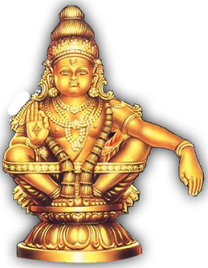God Ayyappa : The Hindu god of growth
Lord Ayyappan or simply Ayyappa (also spelled as Ayappa) is a popular Hindu deityworshiped mainly in South India. Ayyaappa is believed to be born out of the union between Lord Shiva and the mythical enchantress Mohini, who is regarded as an avatar of Lord Vishnu. Therefore, Ayyappa is also known as ‘Hariharan Puthiran’ or ‘Hariharputhra’ which literally means the son of both ‘Hari’ or Vishnu and ‘Haran’ or Shiva.
Why Ayyappa is called Manikandan
Ayyappa is also commonly known as ‘Manikandan’ because, according to the legend of his birth, his divine parents tied a golden bell (mani) around his neck (kandan) soon after his birth. As the legend goes, when Shiva and Mohini abandoned the baby on the banks of the Pampa river, King Rajashekhara, the childless monarch of Pandalam, found the newborn Ayyappa and accepted him as a divine gift and adopted him as his own son.
Why the Gods Created Ayyappa
The legendary story of the genesis of Lord Ayyappa in the Puranas or ancient scriptures is intriguing. After Goddess Durga killed the demon king Mahishasur, his sister, Mahishi, set out to avenge her brother. She carried Lord Brahma’s boon that only the child born of Lord Vishnu and Lord Shiva could slay her, or, in other words, she was indestructible. To save the world from annihilation, Lord Vishnu, incarnated as Mohini, wed Lord Shiva and out of their union Lord Ayyappa was born.
The Story of Childhood
After King Rajashekhara adopted Ayyappa, his own biological son Raja Rajan was born. Both the boys grew up in a princely manner. Ayyappa or Manikantan was intelligent and excelled in martial arts and the knowledge of various shastras or scriptures. He surprised everyone by his superhuman powers.
Royal Conspiracy Against Ayyappa
When it was time to name the heir to the throne, King Rajashekhara wanted Ayyappa or Manikantan, but the queen wanted her own son to be the king. She plotted with the diwan or minister and her physician to kill Manikantan. Feigning illness, the queen made her physician ask for an impossible remedy – lactating tigress’s milk. When no one could procure it, Manikantan volunteered to go, much against his father’s will. On the way, he chanced upon the demon Mahishi and slew her on the banks of the river Azhutha. Manikandan then entered the forest for tigress’ milk where he met Lord Shiva and at his behest sat on the tiger, and came back to the palace.
The Deification of Lord Ayyappa
The King had already understood the queen’s machinations against his son and begged Manikantan’s forgiveness. Manikantan then left for his heavenly abode after telling the king to build a temple at Sabari, so that his memories could be perpetuated on earth.
When the construction was complete, Lord Parasuram sculpted the figure of Lord Ayyappa and installed it on the day of Makar Sankranti. Thus, Lord Ayyappa was deified.
The Worship of Lord Ayyappa
Lord Ayyappa is believed to have laid down strict religious adherence to receive his blessings. First, the devotees should observe a 41-day penance before visiting him in the temple. They should maintain abstinence from physical pleasures and family ties and live like a celibate or brahmachari. They should also continuously contemplate on the goodness of life. Moreover, the devotees have to bathe in the holy river Pampa, adorn themselves with three-eyed coconut and aantha garland and then brave the steep climb of the 18 stairs to the Sabarimala temple.
The Famous Pilgrimage to Sabarimala
Sabarimala in Kerala is the most famous Ayyappa shrine visited by over 50 million devotees it every year, making it one of the most popular pilgrimages in the world.
Pilgrims from around the country brave the dense forests, steep hills and inclement weather to seek the blessings of Ayyappa on the 14h day of January, known as Makar Sankranti or Pongal, when the Lord himself is said to descend in the form of light. The devotees then accept prasada, or the Lord’s food offerings, and descend the 18 steps walking backward with their faces turned towards the Lord.

